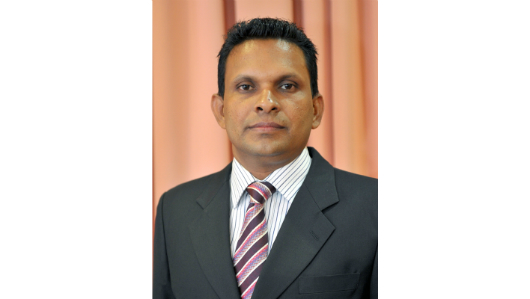Fingerprints lifted from a pistol confiscated from Colonel (Retired) Mohamed Nazim’s residence did not match the former defence minister’s print, Nazim’s legal team has revealed.
At a press briefing this afternoon, Nazim’s lawyer, Maumoon Hameed, explained that a police forensic report shared with defence lawyers stated that “latent prints” from the weapon did not match either Nazim or any of his family members.
“This proves that their evidence has no connection to Colonel Mohamed Nazim,” Hameed contended.
Nazim is currently on trial on charges of illegal weapons possession after police raided his apartment on January 18 and discovered a pistol and three bullets in a bedside drawer. Nazim was subsequently dismissed from the cabinet and arrested on additional charges of treason and terrorism.
Hameed noted that the fingerprints must belong to a “third party” but police have not made any attempt to identify the source of the prints during the investigation after receiving the forensic report on January 20.
Police hastily concluded the investigation on February 9 and forwarded the case to the Prosecutor General’s (PG) office, Hameed added.
Police have so far not responded to requests for an independent forensic examination of the evidence and other information relating to the case, he noted.
In a statement last month, police denied allegations made by Nazim’s legal team that police planted the pistol in the then-defence minister’s apartment to “frame” him, insisting that “nothing was done in violation of procedures, regulations and laws in the investigation of the case.”
Jumhooree Party MP Abdulla Riyaz, a former police commissioner and member of Nazim’s legal team, meanwhile questioned why police did not take video footage of the “forced entry” and midnight raid on January 18.
Riyaz also alleged that police did not take fingerprints from Nazim’s bedside drawer.
Riyaz urged President Abdulla Yameen to initiate an independent inquiry into the incident, contending that Nazim should be immediately released in light of the forensic evidence.
Riyaz reiterated that Nazim was being “framed” by political rivals to “destroy his political career,” adding that Nazim’s “unlawful arrest” would be investigated “some day” in the future.
Adhaalath Party Spokesperson Imran Zahir expressed concern over “obstacles to a free and fair trial” for Nazim due to several irregularities in the trial.
Zahir called on the PG office and Judicial Service Commission (JSC) to arrange for an open and public trial at a larger venue as only six members of the public were allowed into the Criminal Court to observe proceedings.
While Nazim has offered to bear the expense for a public trial at the Dharubaaruge Convention Center in Malé if the state was unable to do so, judges refused the request at a hearing earlier this week.
Anonymised witnesses
At this week’s hearing of Nazim’s trial on illegal weapons possession, lawyers objected to witness statements from 13 anonymised police officers submitted by the prosecution.
Noting that the PG office has redacted the names of the witnesses as well as other details, Hameed said defence lawyers could neither rebut nor impeach anonymous witnesses as it would be impossible to determine if the officers had in fact been present on the scene during the raid.
The state prosectors’ claim that anonymising the police witnesses to ensure their safety was not a reasonable justification without establishing that either Nazim, his family, or supporters have threatened or intimidated witnesses.
The justification was “laughable” as police have said the SWAT team officers involved in the raid were the most highly-trained in the force, he added.
Hameed questioned the officers’ training “if any of them are trembling with fear of Colonel Nazim, or his wife”, adding that it was more likely that they want to remain anonymous to “impede assessment” of their testimony.
Moreover, police and military officers have openly testified at former President Mohamed Nasheed’s trial, Hameed noted, adding that the opposition leader has the support of 45 percent of the electorate.
Hameed accused PG Muhthaz Muhsin of dereliction of duty and failing to protect Nazim’s fundamental rights.
At a High Court hearing on the legitimacy of the search warrant authorising the raid, Hameed said the PG office suggested that the Criminal Court should rule on the legality of the warrant during the trial and the High Court had concurred.
However, Hameed said prosecutors remained silent when Nazim’s lawyers raised the issue at this week’s Criminal Court hearing, after which Judge Yoosuf Abdul Bari Yousuf had said the defence’s request had been noted and asked Hameed to speak on the evidence itself.
“This goes to show that the Prosecutor General does not want to afford these rights. It shows that the Prosecutor General is attempting to impede Colonel Mohamed Nazim from raising these legal points. We note our concern over this and appeal to [PG] not to act like this,” he said.
Related to this story:
Evidence against Nazim consists only of 13 anonymised police statements
Ex-Defence Minister calls for an open, public trial
No hope for fair trial, says former defense minister’s family
Nazim accused of conspiring with Villa group to harm state officials
Ex defense minister’s wife charged with illegal weapons possession
